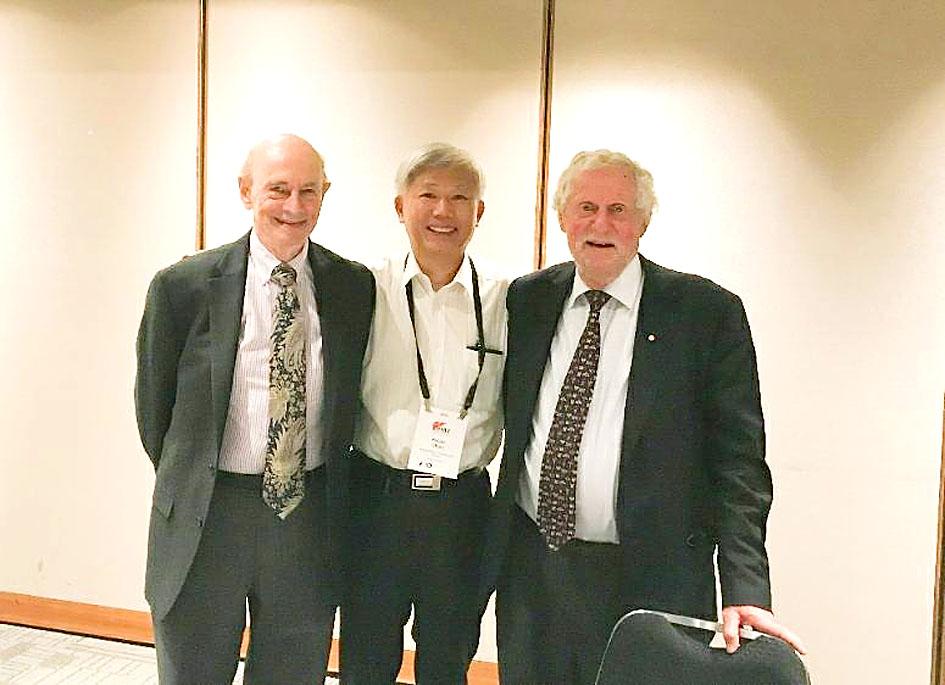Academia Sinica academician Chen Pei-jer (陳培哲), who on Monday resigned from the vaccine review committee, has been accused of working as an adviser for a Shanghai-based Chinese pharmaceutical company.
Chen was allegedly listed as a “scientific adviser” on the Web site of Zhimeng Biopharma Inc (上海摯盟醫藥科技公司) in Shanghai, China, while he served as a committee member, sources said yesterday.
If the claims are true, it could mean Chen had contravened the law restricting government officials and employees from undertaking concurrent jobs in China and other countries.

Photo courtesy of Chen Pei-jer
Chen is also a professor at state-funded National Taiwan University (NTU) and a medical researcher at NTU Hospital.
Chen yesterday said he was not in a paid position at the Chinese firm.
He showed a letter from Zhimeng Biopharma stating that Chen’s scientific adviser role is an honorary title without any responsibility, obligation or payment, and “purely scientific advancement.”
However, critics said Chen and the company were trying to cover up their ties.
When resigning from the committee, Chen accused President Tsai Ing-wen (蔡英文) of pressuring the body to expedite the approval of the MVC-COV1901 vaccine being developed by Medigen Vaccine Biologics.
Citing his reasons for resigning his post, Chen said he believed the committee would have trouble staying neutral when reviewing domestic vaccine candidates.
The main problem was Tsai, as she said a locally developed COVID-19 vaccine is expected to be available late next month, Chen said, insinuating that the Food and Drug Administration could not resist pressure from the president and would expedite the vaccine’s approval.
New Taipei City Councilor Ho Po-wen (何博文) of the Democratic Progressive Party yesterday accused Chen of working to benefit China by sabotaging Taiwan’s vaccine development efforts.
Ho presented documents allegedly showing that Chen had close ties with universities and biotechnology companies in China, including Xiamen University.
Ho also said that Chen timed his resignation and public accusations just before the completion of phase 2 clinical trials of the vaccine, with Medigen scheduled to announce results of human trials soon.
“Chen is undermining Taiwan’s own COVID-19 vaccine to prevent it from reaching production. In his position as a committee member and a medical expert, he is saying Medigen’s vaccine is doomed to failure, and it would not pass clinical trials,” Ho said.

CHAOS: Iranians took to the streets playing celebratory music after reports of Khamenei’s death on Saturday, while mourners also gathered in Tehran yesterday Iranian Supreme Leader Ayatollah Ali Khamenei was killed in a major attack on Iran launched by Israel and the US, throwing the future of the Islamic republic into doubt and raising the risk of regional instability. Iranian state television and the state-run IRNA news agency announced the 86-year-old’s death early yesterday. US President Donald Trump said it gave Iranians their “greatest chance” to “take back” their country. The announcements came after a joint US and Israeli aerial bombardment that targeted Iranian military and governmental sites. Trump said the “heavy and pinpoint bombing” would continue through the week or as long

TRUST: The KMT said it respected the US’ timing and considerations, and hoped it would continue to honor its commitments to helping Taiwan bolster its defenses and deterrence US President Donald Trump is delaying a multibillion-dollar arms sale to Taiwan to ensure his visit to Beijing is successful, a New York Times report said. The weapons sales package has stalled in the US Department of State, the report said, citing US officials it did not identify. The White House has told agencies not to push forward ahead of Trump’s meeting with Chinese President Xi Jinping (習近平), it said. The two last month held a phone call to discuss trade and geopolitical flashpoints ahead of the summit. Xi raised the Taiwan issue and urged the US to handle arms sales to

A magnitude 5.6 earthquake struck off the coast of Yilan County at 12:37pm today, with clear shaking felt across much of northern Taiwan. There were no immediate reports of damage. The epicenter of the quake was 16.9km east-southeast of Yilan County Hall offshore at a depth of 66.8km, Central Weather Administration (CWA) data showed. The maximum intensity registered at a 4 in Yilan County’s Nanao Township (南澳) on Taiwan’s seven-tier scale. Other parts of Yilan, as well as certain areas of Hualien County, Taipei, New Taipei City, Taoyuan, Hsinchu County, Taichung and Miaoli County, recorded intensities of 3. Residents of Yilan County and Taipei received

Taiwan has secured another breakthrough in fruit exports, with jujubes, dragon fruit and lychees approved for shipment to the EU, the Ministry of Agriculture said yesterday. The Animal and Plant Health Inspection Agency on Thursday received formal notification of the approval from the EU, the ministry said, adding that the decision was expected to expand Taiwanese fruit producers’ access to high-end European markets. Taiwan exported 126 tonnes of lychees last year, valued at US$1.48 million, with Japan accounting for 102 tonnes. Other export destinations included New Zealand, Hong Kong, the US and Australia, ministry data showed. Jujube exports totaled 103 tonnes, valued at